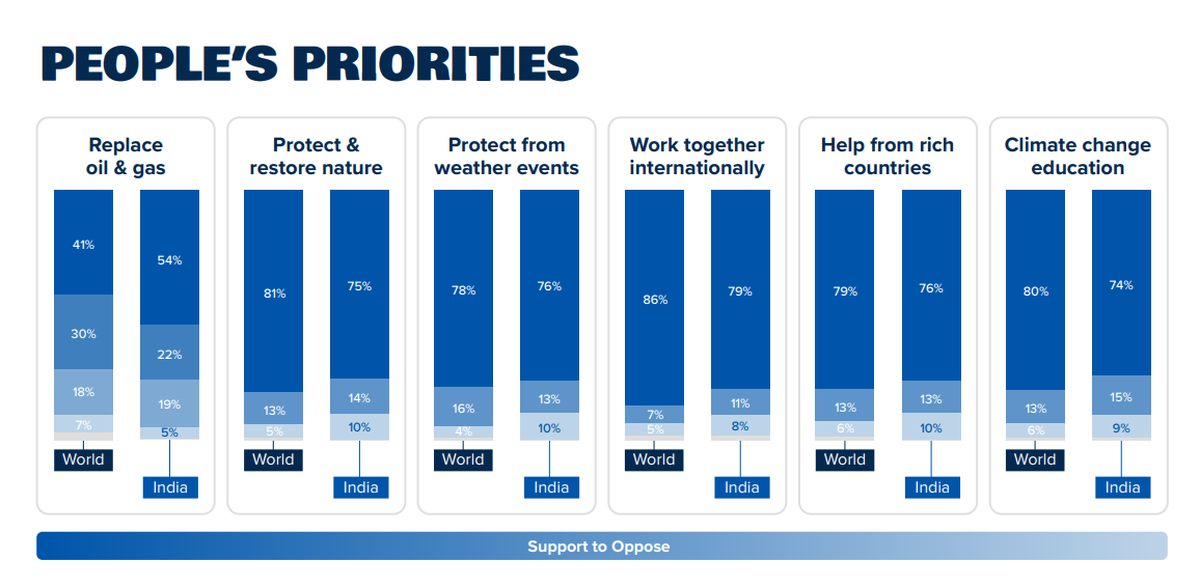
Villagers of Akhupadar village keep a watch on the forest while fighting deforestation in Ranpur block, Nayagarh district, Odisha, 2019.
| Photo Credit: Biswaranjan Rout/The Hindu
Around 77% of Indians who responded to a survey said they want the country to have stronger climate commitments.
Results of the 2024 People’s Climate Vote survey, conducted by the United Nations Development Programme (UNDP), the University of Oxford’s Department of Sociology, and GeoPoll were published on June 20. They show a general trend worldwide of the people of most countries wanting stronger climate commitments to address climate change.
Around 33% of those surveyed in India said that they think about climate change every day, and more than half worry more about it in comparison to the last year. Only 26%, however, think India is addressing climate change “very well”.
Surveyed Indians also performed well on almost all parameters related to people’s priorities – the majority supports replacing oil and gas, protecting people from weather events and restoring nature, transnational support to combat climate change, and gaining help from richer countries.

People’s priorities
| Photo Credit:
People’s Climate Vote Report 2024
The survey comes right after north and central India suffered from an intense heatwave, with extreme temperatures recorded at various locations in the country.
At the same time, thousands of trees in Uttar Pradesh are likely to be felled to make way for the annual ‘kawar yatra’, a Hindu pilgrimage. According to an affidavit submitted in May to the National Green Tribunal by the special secretary of UP Public Works Department in response to a news report, “less than 33,776” trees will be felled for a construction project.
The Upper Ganga Canal Road (Right Bank) has been proposed for construction to counter heavy traffic flow on National Highway 58 which passes through Ghaziabad, Meerut, and Muzaffarnagar, and chokes during the kawar yatra period in the Hindu month of Shravan when almost one crore pilgrims take part in long processions. The affidavit listed a district-wise detail of how many plants and trees will be impacted.
| S.No | District | Total km | Transferred land (hectare) | Affected number of mature trees in the project | Affected number of plants in the project | Total number of affected mature trees and plants in the project |
| 1. | Muzaffarnagar | 56.84 | 113.68 | 16,062 | 811 | 16,873 |
| 2. | Meerut | 42.30 | 84.60 | 13,692 | 52,993 | 66,685 |
| 3. | Ghaziabad | 12.35 | 24.70 | 4,022 | 25,142 | 29,164 |
| Total | 111.49 | 222.98 | 33,776 | 78,946 | 1,12,722 |
“That it is further submitted that the actual felling of trees will be less than 33,776 as the felling of trees will be done only in width of 15 meters where height of embankment is less, The calculation of affected trees (33,776) was initially done on the basis of 20-metre width,” the affidavit said.
Another extensive tree-felling project has been improved under the Union government’s ambitious ₹72,000-crore Great Nicobar Project, where 9.64 lakh trees are expected to be cut a trans-shipment port, an international airport, township development, and a 450 MVA gas and solar-based power plant in the Great Nicobar island.

These are evergreen tropical forests with high biological diversity and the island itself is home to nearly 650 species of flora and 330 species of fauna, including endemic species such as the Nicobar shrew, the Nicobar long-tailed macaque, the Great Nicobar crested serpent eagle, the Nicobar paradise flycatcher and the Nicobar megapode, among many others. Compensatory afforestation would be carried out in Haryana as “the scope of plantation in Andaman and Nicobar Islands is very limited,” former Minister of State (Environment) Ashwini Kumar Choubey said in 2023.





